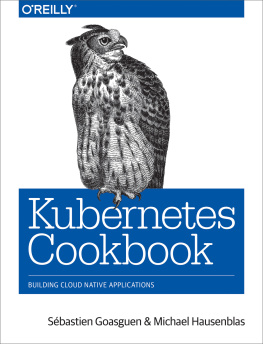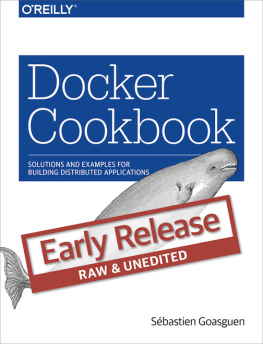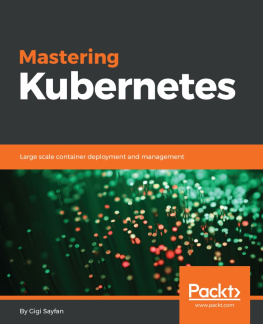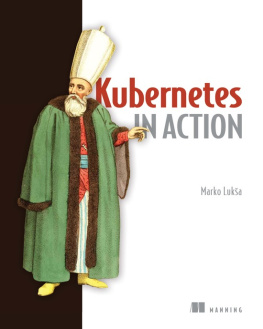Sebastien Goasguen - Kubernetes Cookbook
Here you can read online Sebastien Goasguen - Kubernetes Cookbook full text of the book (entire story) in english for free. Download pdf and epub, get meaning, cover and reviews about this ebook. year: 2018, publisher: O’Reilly Media, Inc., genre: Home and family. Description of the work, (preface) as well as reviews are available. Best literature library LitArk.com created for fans of good reading and offers a wide selection of genres:
Romance novel
Science fiction
Adventure
Detective
Science
History
Home and family
Prose
Art
Politics
Computer
Non-fiction
Religion
Business
Children
Humor
Choose a favorite category and find really read worthwhile books. Enjoy immersion in the world of imagination, feel the emotions of the characters or learn something new for yourself, make an fascinating discovery.
- Book:Kubernetes Cookbook
- Author:
- Publisher:O’Reilly Media, Inc.
- Genre:
- Year:2018
- Rating:5 / 5
- Favourites:Add to favourites
- Your mark:
- 100
- 1
- 2
- 3
- 4
- 5
Kubernetes Cookbook: summary, description and annotation
We offer to read an annotation, description, summary or preface (depends on what the author of the book "Kubernetes Cookbook" wrote himself). If you haven't found the necessary information about the book — write in the comments, we will try to find it.
Kubernetes Cookbook — read online for free the complete book (whole text) full work
Below is the text of the book, divided by pages. System saving the place of the last page read, allows you to conveniently read the book "Kubernetes Cookbook" online for free, without having to search again every time where you left off. Put a bookmark, and you can go to the page where you finished reading at any time.
Font size:
Interval:
Bookmark:
The best infrastructure is the infrastructure you dont see. The Kubernetes Cookbook helps move in that direction. This book provides concrete examples of how to get stuff done so you can get back to your real job. Along the way, youll build a skill set that helps you take your Kubernetes game to the next level.
Joe Beda
CTO and Founder of Heptio,
Kubernetes Founder
The Kubernetes Cookbook is a fantastic hands-on guide to building and running applications on Kubernetes. It is a great reference and a great way to help you learn to build cloud-native containerized applications.
Clayton Coleman
Red Hat
In this Cookbook, Sebastien and Michael collect together a number of useful recipes to get you going with Kubernetes, fast. They surface dozens of helpful hints and tips that will get readers hands-on with practical aspects of installing Kubernetes and using it to run applications.
Liz Rice
Chief Technology Evangelist,
Aqua Security
by Sbastien Goasguen and Michael Hausenblas
Copyright 2018 Sebastien Goasguen and Michael Hausenblas. All rights reserved.
Printed in the United States of America.
Published by OReilly Media, Inc. , 1005 Gravenstein Highway North, Sebastopol, CA 95472.
OReilly books may be purchased for educational, business, or sales promotional use. Online editions are also available for most titles (http://oreilly.com/safari). For more information, contact our corporate/institutional sales department: 800-998-9938 or corporate@oreilly.com .
- Editor: Angela Rufino
- Production Editor: Colleen Cole
- Copyeditor: Rachel Head
- Proofreader: Gillian McGarvey
- Indexer: Ellen Troutman
- Interior Designer: David Futato
- Cover Designer: Randy Comber
- Illustrator: Rebecca Demarest
- March 2018: First Edition
- 2018-02-14: First Release
See http://oreilly.com/catalog/errata.csp?isbn=9781491979686 for release details.
The OReilly logo is a registered trademark of OReilly Media, Inc. Kubernetes Cookbook, the cover image, and related trade dress are trademarks of OReilly Media, Inc.
While the publisher and the authors have used good faith efforts to ensure that the information and instructions contained in this work are accurate, the publisher and the authors disclaim all responsibility for errors or omissions, including without limitation responsibility for damages resulting from the use of or reliance on this work. Use of the information and instructions contained in this work is at your own risk. If any code samples or other technology this work contains or describes is subject to open source licenses or the intellectual property rights of others, it is your responsibility to ensure that your use thereof complies with such licenses and/or rights.
978-1-491-97968-6
[LSI]
For my boys, whose smiles, hugs, and spirits make me a better person.
For my wife with whom I am taking this journey through life.
Sbastien
For Saphira, Ranya, Iannis, and Anneliese.
Michael
Welcome to Kubernetes Cookbook, and thanks for choosing it! With this book, we want to help you solve concrete problems around Kubernetes. Weve compiled over 80 recipes covering topics such as setting up a cluster, managing containerized workloads using Kubernetes API objects, using storage primitives, security configurations, and extending Kubernetes itself. Whether you are very new to Kubernetes or have been using it for a while, we hope that youll find something useful here to improve your experience and use of Kubernetes.
Youre a developer going cloud-native, or a sysadmin, or maybe youve even found yourself in one of the newfangled DevOps roles? This book will help you navigate your way successfully through the Kubernetes jungle, from development to production. These recipes are not organized in a linear progression of the basic Kubernetes concepts; however, each chapter contains recipes that utilize core Kubernetes concepts and API primitives.
Both of us have been using and contributing to Kubernetes for a few years and have seen the many issues beginners and even more advanced users run into. We wanted to share the knowledge weve gathered running Kubernetes in production, as well as developing on and in Kubernetesi.e., contributing to the core codebase or the ecosystem and writing applications that run on Kubernetes.
This cookbook contains 14 chapters. Each chapter is composed of recipes written in the standard OReilly recipe format (Problem, Solution, Discussion). You can read this book from front to back or skip to a specific chapter or recipe. Each recipe is independent of the others, and when an understanding of concepts from other recipes are needed, appropriate references are provided. The index is also an extremely powerful resource because sometimes a recipe is also showcasing a specific command and the index highlights these connections.
At the time of writing, However, the solutions presented here should, in general, work for older releases, at least down to Kubernetes 1.4; we will call it out explicitly if this is not the case, mentioning the minimum required version.
The Kubernetes release cadence as of 2017 is such that every quarter a new (minor or dot) release is cut; for example, 1.6 was released in March, 1.7 in June, 1.8 in September, and 1.9 in December, as this book was entering production. The Kubernetes release versioning guidelines indicate that you can expect support for a feature for three minor releases at a time. This means that the stable API objects in the 1.7 release will be supported until at least March 2018. However, because the recipes in this book most often only use stable APIs, if you use a newer Kubernetes release, the recipes should still work.
This intermediate-level book requires a minimal understanding of a few development and system administration concepts. Before diving into the book, you might want to review the following:
bash (Unix shell)This is the default Unix shell on Linux and macOS. Familiarity with the Unix shell, such as for editing files, setting file permissions and user priveleges, moving files around the filesystem, and doing some basic shell programming, will be beneficial. For a general introduction, consult books such as Cameron Newhams Learning the bash Shell or JP Vossen and Carl Albings bash Cookbook, both from OReilly.
Package managementThe tools in this book often have multiple dependencies that need to be met by installing some packages. Knowledge of the package management system on your machine is therefore required. It could be apt on Ubuntu/Debian systems, yum on CentOS/RHEL systems, or port or brew on macOS. Whatever it is, make sure that you know how to install, upgrade, and remove packages.
GitGit has established itself as the standard for distributed version control. If you are already familiar with CVS and SVN but have not yet used Git, you should. Version Control with Git by Jon Loeliger and Matthew McCullough (OReilly) is a good place to start. Together with Git, the GitHub website is a great resource to get started with a hosted repository of your own. To learn about GitHub, check out http://training.github.com
Font size:
Interval:
Bookmark:
Similar books «Kubernetes Cookbook»
Look at similar books to Kubernetes Cookbook. We have selected literature similar in name and meaning in the hope of providing readers with more options to find new, interesting, not yet read works.
Discussion, reviews of the book Kubernetes Cookbook and just readers' own opinions. Leave your comments, write what you think about the work, its meaning or the main characters. Specify what exactly you liked and what you didn't like, and why you think so.





